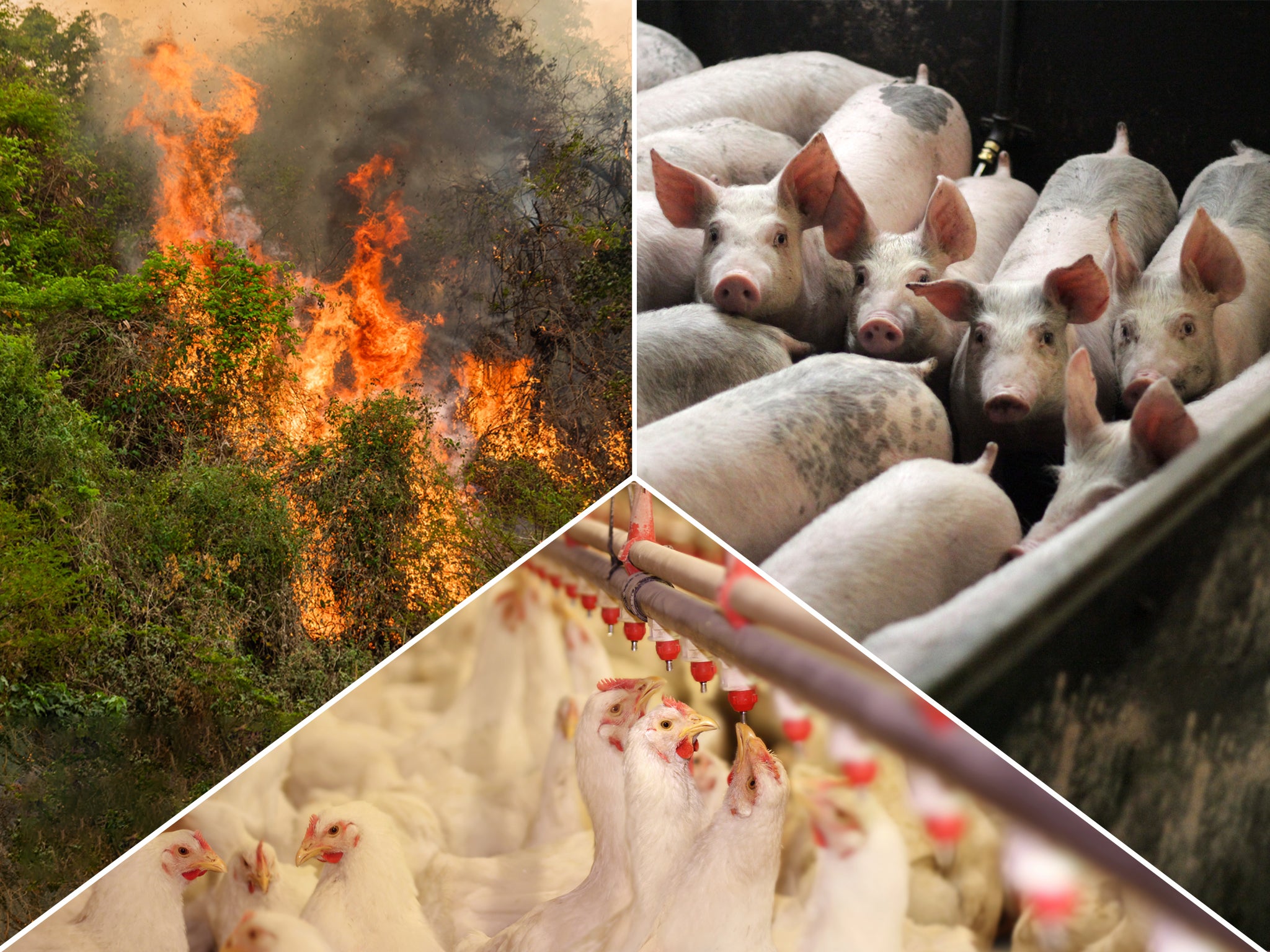UK councils investing millions in factory farming through their pension funds
Exclusive: Estimated £238m poured into industrial livestock companies, analysis shows

Your support helps us to tell the story
From reproductive rights to climate change to Big Tech, The Independent is on the ground when the story is developing. Whether it's investigating the financials of Elon Musk's pro-Trump PAC or producing our latest documentary, 'The A Word', which shines a light on the American women fighting for reproductive rights, we know how important it is to parse out the facts from the messaging.
At such a critical moment in US history, we need reporters on the ground. Your donation allows us to keep sending journalists to speak to both sides of the story.
The Independent is trusted by Americans across the entire political spectrum. And unlike many other quality news outlets, we choose not to lock Americans out of our reporting and analysis with paywalls. We believe quality journalism should be available to everyone, paid for by those who can afford it.
Your support makes all the difference.UK councils are investing millions in factory farming through their staff pension funds, new analysis has found, prompting environment and animal rights campaigners to call for more “climate-conscious” financing.
An estimated £238m of investments in industrial livestock companies are held by local authorities pension funds, according to an assessment by the campaign groups Feedback and World Animal Protection.
Local authorities have previously come under fire for investing billions in fossil fuels through pension funds, and six have already committed to divesting their portfolios.
Campaigners argue the “next frontier” of divestment should be in factory farming, pointing to the industry’s carbon footprint, links to deforestation and animal cruelty.
The five biggest meat and dairy companies worldwide have been shown to collectively emit more greenhouse gases than oil and gas giant ExxonMobil, and more than Shell or BP, the Institute for Agriculture and Trade Policy calculated.
As of February 2021, 74 per cent of UK councils had declared a climate emergency but Feedback and World Animal Protection argue that intensive animal farming is currently a “blind spot” for local authorities.
Livestock is responsible for around 14.5 per cent of the total human-caused greenhouse gas emissions globally. The government’s Climate Change Committee advised ministers last year to urge the public to eat less meat and dairy if progress was to be made on net-zero pledges.
An average of just 0.1 per cent of the local authorities’ pension fund investments were in industrial livestock, making them easier to divest, according to the report on the scale of the issue.
Analysis of figures, obtained through freedom of information requests, found that the West Midlands pension fund had the largest investment in industrial meat and dairy companies, standing at £35.9m.
A spokesperson for the fund said it was “fully committed to aligning with the goals of the Paris Agreement and net-zero ambition by 2050 or sooner”. They added the fund sought to “ensure resilience as we decarbonise”.
Researchers also found Swansea council’s pension fund had invested £12.4m, and Strathclyde and Clwyd funds had put in £10.3m each.
The process of actually divesting money can be difficult, however, and may take multiple years to complete.
A third of the estimated £238m total is direct investments in major livestock companies, but 67 per cent were indirect investments.
Multiple councils also often have their pensions administered by the same fund, with one local council named as the “administering authority”.
That means the administrator is legally responsible for managing the fund and its investments, although representatives from other councils can also sit on the board and guide decisions.
Some councils, such as Glasgow, say that despite being an administrator of their funds they cannot direct their investments.
Councillors have had some success however in passing motions calling on their funds to divest, as happened in Luton Borough Council over fossil fuel company investments.
Some councils have shown they can work to reduce their exposure to high-carbon investments. Research carried out by groups Platform and Friends of the Earth found last year that councils’ pension fund investments in fossil fuels had decreased to nearly £10bn, down from £14bn in 2015.
A spokesperson for Swansea council said that they had “reduced our carbon footprint in equity investments by more than 50 per cent” since 2018.
They added: “It’s always been our view that it is best to take a whole-portfolio approach and not explicitly exclude any sector, including livestock.”
Martin Bowman, senior campaigner at Feedback, said: “Industrial livestock corporations are simply not compatible with a climate-safe future and like fossil fuels, have no place in the pension portfolio of a climate-conscious local authority.
“We’re calling on councils to divest their bonds and shares in these companies.”
Some £230million of the council’s investments are in just 15 companies, accounting for 97 per cent of the money, the research shows.
The largest investments are in China Mengniu Dairy, Tyson Foods, WH Group and Yili Group.
China Mengniu Dairy and the Yili Group are China’s two leading dairy companies, which together control 40 per cent of the country’s dairy market.
Tyson Foods is the world’s second-largest meat processor, with annual revenue of £31.2bn, while the WH Group is the world’s largest producer of pork.
Lindsay Duncan, campaign manager at World Animal Protection, said: “Public funds should be used to invest in our future not to jeopardise it.
“We urge local authorities to consider all aspects of harmful factory farming including poor welfare, deforestation, species loss and the devastating effects of climate change.”
Join our commenting forum
Join thought-provoking conversations, follow other Independent readers and see their replies
Comments